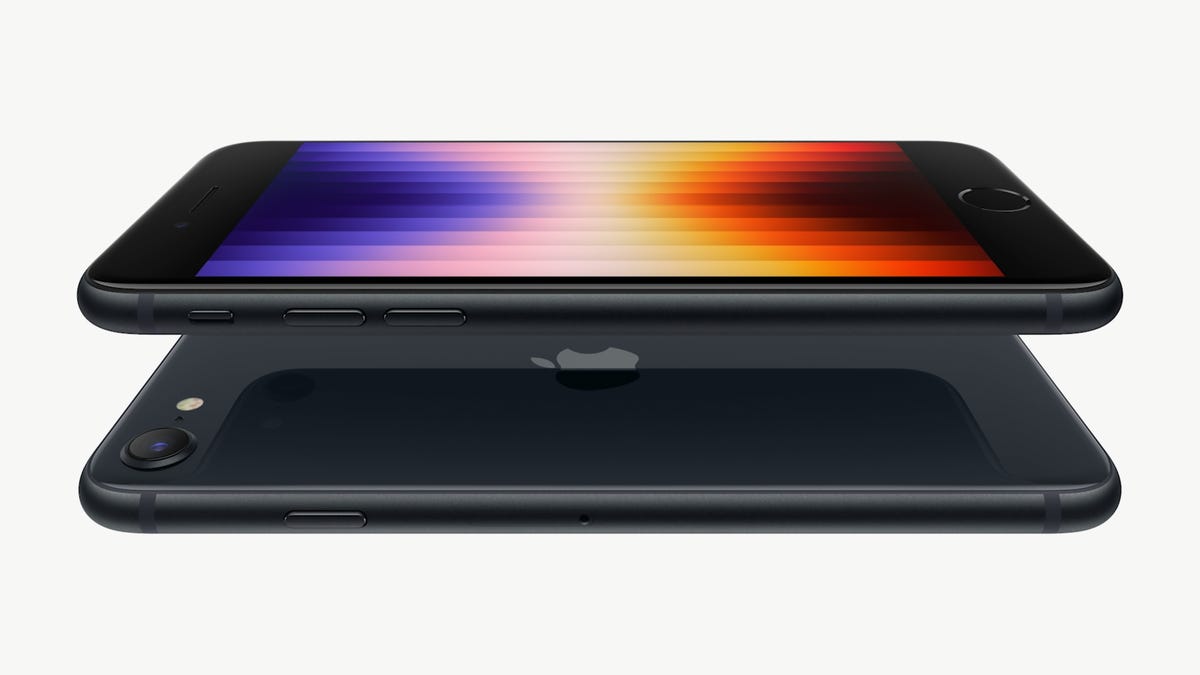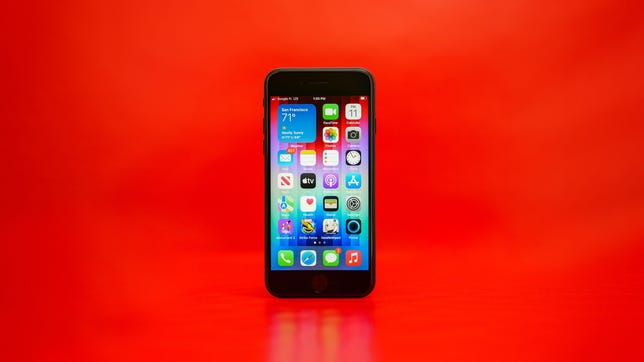An update to the budget iPhone SE arrived at Apple’s first event of 2022 on Tuesday, boasting 5G support and the same Apple A15 processor that the 2021 flagship iPhone 13 series uses. These two upgrades are significant, but the iPhone SE 2022 has several other features worth noting.
Aside from minor cosmetic changes, the third generation of the iPhone SE looks identical to the previous model, which launched in 2020. The phone still has a 4.7-inch screen and massive top and bottom bezels. It also keeps the Home button with Touch ID, making it ideal for folks who don’t want to use facial recognition to unlock their phones.
Read more: iPhone SE 2022 vs. iPhone SE 2020: Here’s How They Measure Up
Read on for the extra features the new iPhone SE brings and what you’ll miss by opting for the iPhone SE over pricier iPhones. It’s also worth noting that the new budget phone costs $429 (£419, AU$719), a $30 price bump over the last iPhone SE 2020, but the iPhone SE 2022 is still far more affordable than its iPhone 13 siblings.


Now playing:
Watch this:
Apple’s 2022 iPhone SE Is Equal Parts New and Old
8:02
5G connectivity: Sub-6 yes, mmWave no
The iPhone SE’s most exciting new feature is support for faster data speeds through 5G networks. Keep in mind that the iPhone SE doesn’t support all kinds of 5G — it can’t connect to the parts of networks that use the speediest mmWave type of 5G, which is mainly found right now in city centers and stadiums. That’s fine for most folks, since the iPhone SE can connect to any of the low- and midband frequencies in so-called sub-6 5G, which can download data much faster than what most phones can get from current 4G LTE networks.
As carriers continue building out their 5G networks in 2022 and beyond, we’re still figuring out which the iPhone SE can connect to. For now, we know that the iPhone SE works with C-band frequencies in the 3.7GHz to 3.98GHz range that started going live for US carriers.
AT&T has confirmed that the iPhone SE will not support the 3.45GHz midband that will be added to its 5G network later this year, which only 2022’s best phones can connect to.


Apple/Screenshot by Sarah Tew/CNET
A15 Bionic chipset: Better performance, more iOS updates
First introduced in September with the iPhone 13 range, the A15 Bionic chipset is Apple’s most advanced mobile silicon. Beyond 5G connectivity, it grants the iPhone SE a few new tricks.
The iPhone SE promises to be speedier than most other budget phones and benefit from iOS 15’s features. It also should support the same life span of iOS updates as the iPhone 13, which could extend for seven years or more given how long Apple is currently updating its oldest phones.
On the camera front, the new chipset should empower the iPhone SE to take better photos than its predecessors, but only due to computational photography improvements and AI tricks. The new phone has the same cameras as the 2020 model: a single 12-megapixel, an f1.8 rear camera and a 7-megapixel, f2.2 front-facing shooter.
Just don’t expect Apple’s newest budget phone to be as powerful as its flagships. Even with the same A15 Bionic processor, the iPhone SE’s 3GB of RAM should slow down gaming performance and apps compared with the iPhone 13 Pro’s 6GB, though we’ll have to test the new device to know by how much. Expect a full review soon.
Stronger glass back
The new iPhone SE looks almost unchanged from its last model, but stronger glass has replaced what was on the 2020 iPhone SE, which packed the same older glass as the iPhone 8 that launched in 2017. That should mean more durability for the new iPhone SE’s back cover, as Apple used the same glass that’s on its iPhone 13 range.
Though the reinforced glass back is a classy touch, it’s unclear if it will change the shape of the new iPhone enough to make it incompatible with existing cases and accessories. Both have the same dimensions, even if the new phone is slightly lighter (144 grams versus 148 grams).
Read more: Best Apple SE Case for 2022
What’s the iPhone SE experience like?
Given the success of its predecessors, the new iPhone SE will almost certainly be a popular phone that sells well, especially for people who prefer Touch ID and the physical home button or just want a cheaper iPhone that’s half the price of the iPhone 13.
While we haven’t yet fully reviewed the new iPhone SE, it does lack some features and polish. Its lower-resolution LCD display can’t render as crisp a picture with as verdant colors as the sharp OLED screens on the iPhone 13 range. And while the new budget phone shares the same chipset, the iPhone 13 has more RAM, more storage and a bigger battery with wireless charging.
The iPhone SE’s single rear camera is also outclassed by the additional lenses on the iPhone 13 range, with the iPhone 13 Pro featuring an ultrawide and 12-megapixel 3x optical zoom cameras. Android users pondering a switch to a cheaper iPhone may be disappointed, since budget phones from Samsung and Motorola often have dual or even triple rear cameras.
But the iPhone SE still promises most of the flagship Apple phone experience at an affordable price. If you just want an iOS phone to use a few apps on, watch some shows and take some daylight photos with, the iPhone SE should have the right assortment of essential features for you.


Patrick Holland/CNET
Apple iPhone SE (2022)
Most affordable iPhone
The long-awaited successor to the 2020 iPhone SE was announced by Apple during its March 8 “Peek Performance” event. It features Apple’s A15 chip (which is the same one found in the iPhone 13 series), 5G and stronger glass and maintains the same overall design as the previous generation.
Pricing for the new iPhone SE starts at $429 and preorders begin on March 11.
Read our iPhone SE (2022) review.
$429 at Apple



